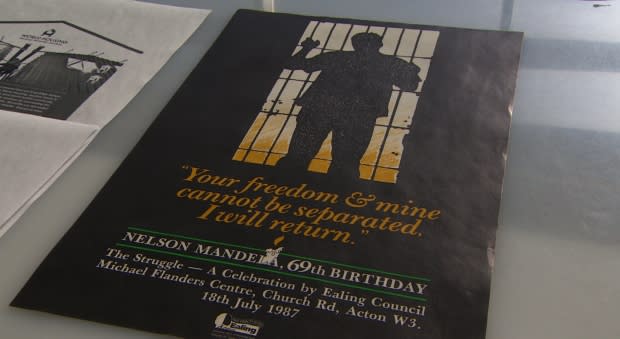'Better than good': Designer Angela Bains on race, design and pushing for social change
Angela Bains remembers a night in the late 1980s when someone broke into each of her three studios in London, U.K. They didn't take anything but they were sending a message.
Bains, a graphic designer, had been working with a campaign protesting South Africa's racist apartheid regime and the imprisonment of Nelson Mandela, who was a political prisoner at the time.
She designed a postcard to send for Mandela's birthday with the idea to send tens of thousands of cards to South Africa, clog up the post offices, and send a signal to Mandela and his fellow prisoners the world hadn't forgotten them.
"It was a very exciting time. Writers, poets, graphic designers, artists, musicians — we were all getting together around this cause," said Bains in an interview at the British Columbia Institute of Technology's MediaWorks centre.

But Bains said those who protested the regime would often be under surveillance by members of the South African Secret Police.
Today Bains, 59, an instructor at BCIT since 2012, uses her work on the campaign as an example of how graphic design can have a progressive impact in the world.
And her students have responded positively: Bains has won the BCIT Teaching Excellence Award, nominated by her students and faculty, twice.
'Better than good'
Bains, who grew up in Notting Hill, a district in London, came to graphic design when choices for young, black women were limited.
"When you went to see your careers counsellor, she would basically say to you, 'OK, have you decided whether you're going to be a secretary or become a nurse?'
"Some of us had fancier ideas," Bains said with a wry smile.
She picked graphic design, partly because it was the only program that would take her at the age of 16. But as the only black person in her program at the University of the Arts London, Bains said, for her, it was important to be excellent.
"Being better than good was what you had to strive for so people would look at the work and not your colour."
This was especially true in her early career. Bains, who graduated in 1979, initially worked at a firm, but in 1984, she decided to start her own business in London.
Though she had started out doing a lot of design projects for causes like environmental projects or social justice, growing her business meant taking on commercial projects, namely for BBC, Marks and Spencer, and Disney among others.
In 1993, Bains moved to B.C. with her family. where she has lived ever since.
Changes in student make-up slow
Bains says things have changed since she was a student in college, but there is still a lack of racialized students in design programs.
"I think a lot of immigrant families don't see graphic design as a stable career," she said.
Industry also stymies diversity because people tend to hire people who are like them, or use networks that exclude certain students.
"There's no realization that there may be some sort of unconscious bias going on," Bains said.
Projects for social change
However, she still has hope for change in the industry and how her students can be agents for progressive social change.
Thirty years after her Mandela campaign, her students are picking up the mantle of making a difference through design.

Past students have taken on challenges like designing posters for domestic violence awareness or concepts for a non-profit organizations encouraging girls to take up trades.
"Our design students can contribute greatly. These are the creative minds of the future."

